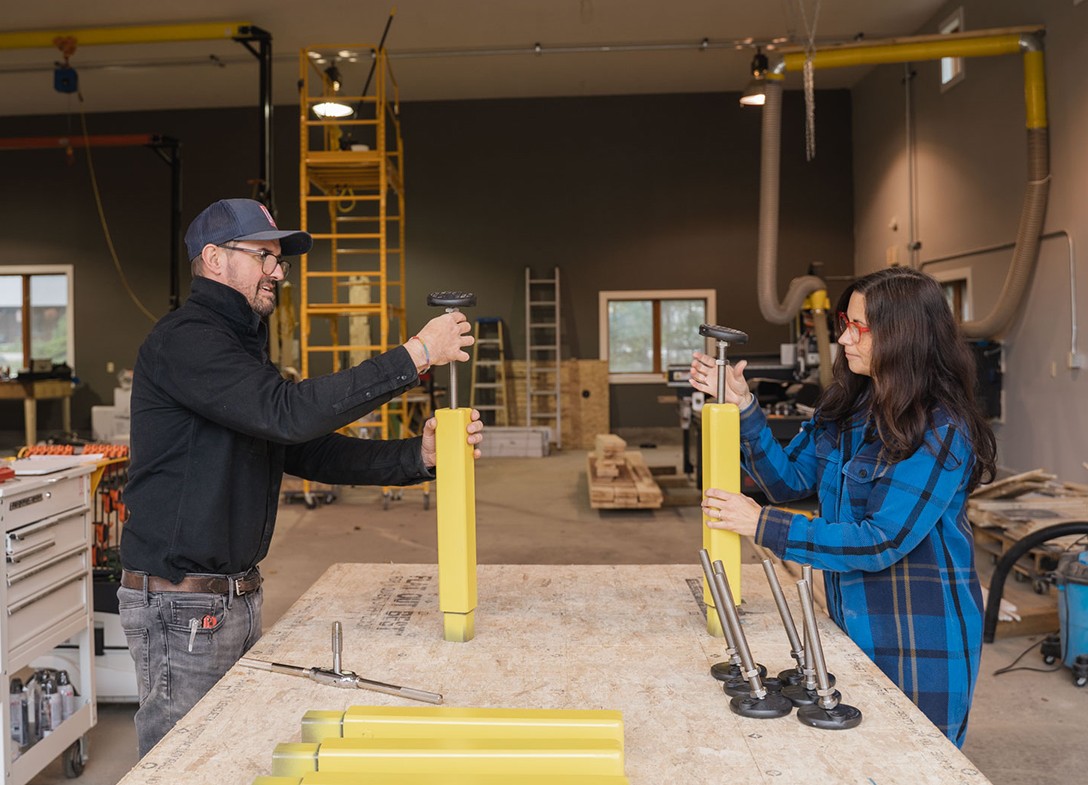Vermont Architect to Build Sustainable Affordable Housing

Vermont Architect Secures CDFI Funding to Build Sustainable Affordable Housing after Pandemic and 2023 Flood
Since its inception in 2018, Up End This has been revolutionizing the housing industry, urging us to rethink our building and living practices. Led by founder Michael Zebrowski, the company specializes in crafting atypical accommodations known as “satellites.” These sustainable accessory dwelling units (ADUs), or prefabricated spaces, are crafted to tackle one of the most challenging issues facing our nation today – the housing crisis – which has been exacerbated by the impacts of COVID-19 and climate change.
“It’s been tough,” Michael said, “but another day, another fight. We just keep going. I was a punk rock kid; I grew up upset about what I saw. There was this feeling of frustration and desire for change. I’ve always wanted to solve all the world’s problems. Now I’m focusing that all into one solution – affordable housing. That’s where we are going. I know we’re on that path.”
CDFIs Foster Resilient and Sustainable Communities
When he needed to expand his business, Michael sought permanent working capital to grow staff to support sales, marketing, and inventory and receivables. However, Up End This was too early stage for mainstream banks and needed to find alternative sources of capital, in addition to the loan he already had received from OFN member Vermont Community Loan Fund.
In 2022, with the support of an equity investor, Michael connected with OFN member Flexible Capital Fund (Flex Fund). This community development financial institution (CDFI) was willing to take more risk and offered a revenue-based financing (RBF) loan. This type of financing allows businesses to repay the investment using a percentage of their future gross revenues. The RBF loan aimed to bolster Up End This’ working capital requirements.
Flex Fund also partnered with the Northern Community Investment Corporation to provide additional funding in the RBF debt. In addition, the CDFI paid for a business coach to help Up End This get its financial systems in order.
“We wouldn’t be here without the Flexible Capital Fund and the others,” Michael said. “We just wouldn’t have survived. First, without the funding we would never have gotten to where we are. And the day after the flood, we had a ten person call with the Flex Fund, our Vermont Sustainable Jobs Fund business coaches, the Vermont Community Loan Fund. It was insane to have that support, compassion, and wisdom in the moment, you know… without that we just would not be here.”
Business Coaching and Capital Are Key to Entrepreneurial Success
On July 10, 2023, heavy rain and flooding devastated much of Vermont, including the town of Johnson where Up End This is based. At the business facility, water levels reached chest height. “When we opened the computer cabinet to the CNC router, water just gushed out,” Michael said. “You could literally hear the water and air fizzing out of the land. I just turned on my camera and started filming. I was literally speechless.”
They were not in a designated flood plain. But by that point, he was too invested – and too determined – to give up. “There were so many communities impacted by the flood and everyone was asking, what are we going to do? Where will people live?” Michael continues. “I want to build these. I want people to live in them. I want to make a dent in the innovation that can make housing affordable.”
Flex Fund’s monthly portfolio calls have helped Michael and other entrepreneur clients like him, to talk about resiliency planning, insurance-related issues, and best practices, especially after the flooding.
The key, says Michael, is streamlining the design build process. His business model moved away from traditional construction toward a manufacturing approach that more closely resembles the auto industry. That is the part he is still working to restore post-flood.
Housing Crisis Spurred by the Pandemic and Climate Change
The housing crisis has been a longstanding issue in many parts of the world, including the United States, and the COVID-19 pandemic has only amplified its impact. From job losses, to business closures to rising housing costs and evictions, these impacts have led to increasing financial instability for many individuals and families, particularly low-income and low-wealth households.
In response, various policy measures were implemented to mitigate the impact on housing stability, including eviction moratoriums, rental assistance programs, and funding initiatives. However, concerns about the surge in homelessness and housing instability continue to rise and the effects of climate change are worsening.
Michael recognized an opportunity for his satellites to address these housing challenges. Beyond serving as offices or studios, these satellites serve as both temporary shelters for unhoused individuals and long-term sustainable and affordable housing options. With support from CDFIs in his community, he has been able to pursue his purpose to ensure everyone has a safe place to live.
How the CDFI Industry is Addressing Climate Change
In April, OFN was selected to receive a $2.29 billion award from the Environmental Protection Agency. This marks a pivotal step forward in OFN’s commitment to addressing the climate crisis on behalf of the CDFI industry, advancing environmental justice, and increasing access to capital in the nation’s most vulnerable communities.
Learn more here.